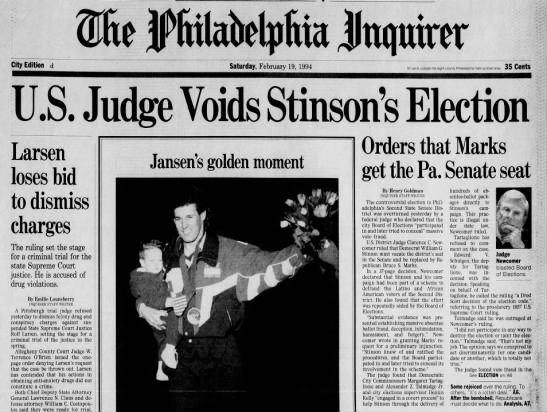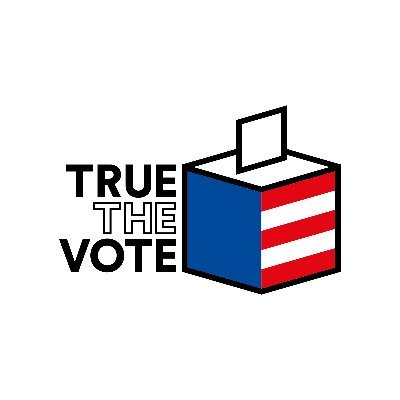By Carol King
To everyone who's told him there is no hope, it's over, and time to concede, President Trump responded in an interview on Friday, "Never bet against me." Commentators like Hugh Hewitt, Karl Rove, and Byron York, disagree. “So far, the Trump Campaign, has not filed any challenge that appears likely to overturn the results in any state.” But courts can reverse election outcomes and precedent from a 1994 Pennsylvanian case proves how.
The case for hope: 1994 court decision reverses election result
 A 1993 special election to fill the 2nd Senatorial District seat of Pennsylvania was held following the death of State Senator Frank Lynch. The race was between Bill Stinson on the Democrat side and Bruce Marks for the Republicans. Bruce had made gains against Frank Lynch in the 1990 contest, so the Democrat Machine was concerned that Stinson was not well known or popular in new areas of the district added via a 1992 gerrymander. The seat was important because it held the balance of power for the State, a Republican gain would swing it to Republican control, a Democrat win would give power to Democrats.
A 1993 special election to fill the 2nd Senatorial District seat of Pennsylvania was held following the death of State Senator Frank Lynch. The race was between Bill Stinson on the Democrat side and Bruce Marks for the Republicans. Bruce had made gains against Frank Lynch in the 1990 contest, so the Democrat Machine was concerned that Stinson was not well known or popular in new areas of the district added via a 1992 gerrymander. The seat was important because it held the balance of power for the State, a Republican gain would swing it to Republican control, a Democrat win would give power to Democrats.
When the votes were counted, it looked like Marks for the Republicans had narrowly won. Out of nearly 40,000 votes, he led by 562. Then, out of nowhere, after absentee ballots were counted, Democrats took the lead. Stinson received 1,391 votes compared to just 366 for Marks. The results changed and Stinson was declared the winner by 463.
Bruce Marks was suspicious about the result and those suspicions were confirmed when he was told by a sitting City Councilman that the Democrats had cheated via absentee ballot. Marks said the very, very large number of absentee ballots in an area with typically low-voter participation had “sent up all kinds of red flags. When we tried to challenge absentee ballots at the polls, the Democratic committee people and election officials wouldn’t let us into some places. They threatened us.”
Sounds a lot like mechanisms used against the Trump 2020 campaign
To continue, Marks added, “They were also ringing voters in—where voters didn’t actually come to the polls, but before the polls opened or afterward, officials would just sign them in and vote for them. As it would turn out, a couple of those voters were dead.”
The Philadelphia Inquirer interviewed voters in the district and found 220 irregularities in absentee ballots and 24 instances of forged documents. This prompted the Dept. of Justice and Pennsylvania Attorney General's offices to get involved. They discovered “hundreds of voters in Black and Latino areas of the 2nd district were cajoled, or misled into casting absentee ballots. Many ballots were improperly cast. Some were forged. Some voters unfamiliar with absentee balloting were coached to vote Democratic.”
How the Democrats “won”
Local resident Zoraida Rodriguez, speaking at the time, said, “One week before election day, a man came to her house with an absentee ballot and asked her to put a check in a box and sign her name. She did, and he left. The next day, a woman appeared at her door with another absentee ballot and asked that her husband vote. When Rodriguez explained that her husband was in prison, the woman directed her to cast the vote for him. 'Anybody can vote for anybody else,' " the woman allegedly explained.
Later, unsure whether she had voted properly, Rodriguez went to the regular neighborhood polling place on election day. She admitted, “I voted twice. I wanted to vote legal like you're supposed to do. I didn't trust the absentee ballot."
Voter Diana Irizarry also recounted her experience. "A campaign worker came to my door and explained there was a new law out, and he was taking absentee ballots. It was a new system, and they were trying out absentee ballots, and was I willing to sign?”
Diana said the ballot she was shown had no names, just a choice between a straight Democrat ticket and a straight Republican ticket. She said she wanted to vote for Bruce Marks, but the worker “told me to put Democrat, and I signed.” Diana believed she was “misled," since Marks is a Republican.”
During a four-day trial, Marks and the Pennsylvania Republican Party filed these examples as evidence, along with evidence of residents being encouraged to vote by absentee ballot even though they had no legal reason—like a physical disability or a scheduled trip outside the city—to do so. Evidence of Democrat campaign workers forging absentee ballots included using the names of people who were living in Puerto Rico, serving time in prison, “paying people a dollar to sign an application, or telling them they could win a new refrigerator.” Ballots were hand-delivered to the City Commissioner’s office, breaking state law, “which didn’t matter because then City Commissioners Marge Tartaglione and Alex Talmadge were in on the scheme,” Marks said.
In response, Pennsylvania Democrat Party, Executive Director Rick Bloomingdale said, “I don't think anybody did it intentionally. It was all intended to increase voter participation.”
Judge flips outcome
Judge Clarence C. Newcomer of Federal District Court was not convinced by the Democrats' defense. He ruled “Philadelphia's election system had collapsed under a massive scheme by Democrats to steal a State Senate election.” He invalidated the vote and ordered Bruce Marks to be certified the winner within 72 hours, Stating, “This is extraordinary relief; however, it is appropriate because extraordinary conduct by the Stinson campaign and the board tainted the entirety of the absentee ballots."
Legal experts said that Judge Newcomer's decision was highly unusual because he threw out all of the 1,757 absentee ballots. Others disagreed and cited larger cases of voter fraud: Chicago, Louisiana in the 1970s, and Alabama in the 1980s. In fact, the United States Court of Appeals for the 11th Circuit, in Atlanta, ruled in Curry vs. Baker, 1986 that there was no need to be "mathematically precise" when a candidate has engaged in "massive" violations of election law.
Similarities with Trump campaign lawsuits
Over the last 12 days, we have heard details of Trump campaign lawsuits, with evidence of voters being deprived of their constitutional right to vote in a free and fair election through Democrat tricks. Efforts that dilute the worth of votes.
Additional legal efforts from individuals and organizations have the potential for court reversals, too.
True the Vote
 True the Vote, filed a lawsuit in Georgia on Nov. 13, to investigate voter rolls and establish how many illegal votes were cast. Part of the “Validate the Vote” initiative, they represent four legally registered voters who believe there is enough suspicion of illegal voting to warrant an investigation. The aim is to investigate violations of election law and ensure election integrity.
True the Vote, filed a lawsuit in Georgia on Nov. 13, to investigate voter rolls and establish how many illegal votes were cast. Part of the “Validate the Vote” initiative, they represent four legally registered voters who believe there is enough suspicion of illegal voting to warrant an investigation. The aim is to investigate violations of election law and ensure election integrity.
The Board of Elections and Registrations for eight counties along with Governor Brian Kemp and Secretary of State Brad Raffensperger are named as defendants in the lawsuit.
True the Vote, says as a result of the credible suspicion of illegal election activity in Georgia, the lawsuit demands that election officials produce:
-Poll lists
-Voter registration lists
-Records of mail-in, absentee, provisional, and limited ballots
-Driver license and state ID records
-Information about voters contacted to “cure” rejected ballots
-Citizen complaints pertaining to election integrity
So that the voting experts can analyze who voted, use sophisticated data analytics to determine if actual illegal votes were cast, and how many, in eight Georgia counties: Chatham, DeKalb, Fulton, Clayton, Gwinnett, Cobb, Richmond, and Henry. If the investigations unearth evidence of illegal votes that affect the presidential election results, they would seek to overturn those results.
The lawsuit suit asks the Court to expedite discovery of poll lists etc. to do the investigation and take action before the Dec. 8, 2020 deadline for Georgia to certify the results of the presidential election. Government bodies are required by law to respond no later than five days after the request, though they may also obtain a 10-day extension. “Illegal votes dilute the lawful votes, which is a violation of the voting rights of Georgia’s legitimate voters and a violation of the equal protection clause,” True the Vote said.
Further
True the Vote filed similar lawsuits in Pennsylvania and Michigan. In Michigan the lawsuit claims that ballot counting was not transparent, dates on ballots were changed illegally, software glitches affected results, and more than 50 Michigan counties, including the largest two—Wayne County and Washtenaw County—had more registered voters than eligible voting-age citizens. Wayne County’s voter registration rate was 107 percent, while Washtenaw County’s was 113 percent. “This warrants investigation,” they say.
Shenanigans that permeate American elections are as old as the Republic, by demonstrating systematic fraud, or constitutional violations, courts will get involved, and hopefully provide a remedy.
Carol King received a first class BA (honors) in History and Politics from Stirling University, along with an exceptional commendation for a study on US public opinion and Foreign Policy. She also completed a year of study at University of London before taking up a Graduate Proctor Fellowship at Princeton University. She further completed a MPhil in American Politics at Dundee University. Aspiring to be a writer/commentator on American politics, she now writes for UncoverDC.
Twitter: @CarolKing561


